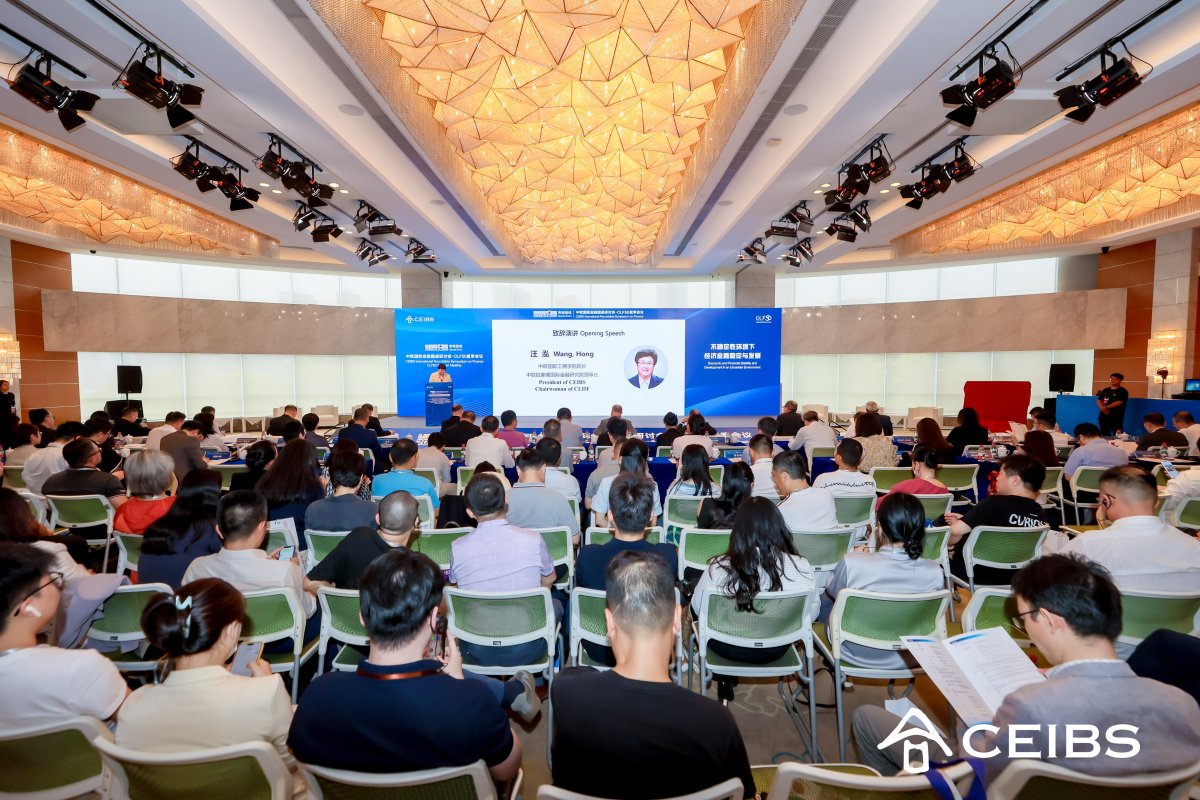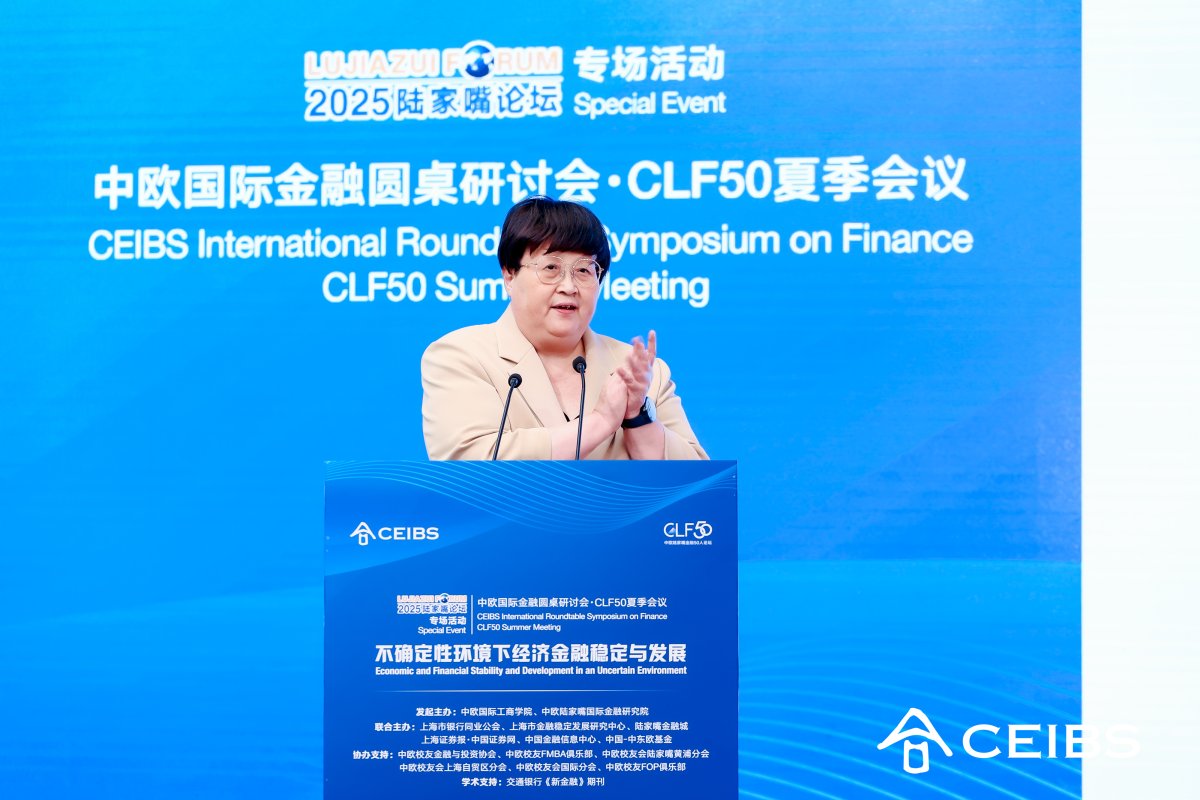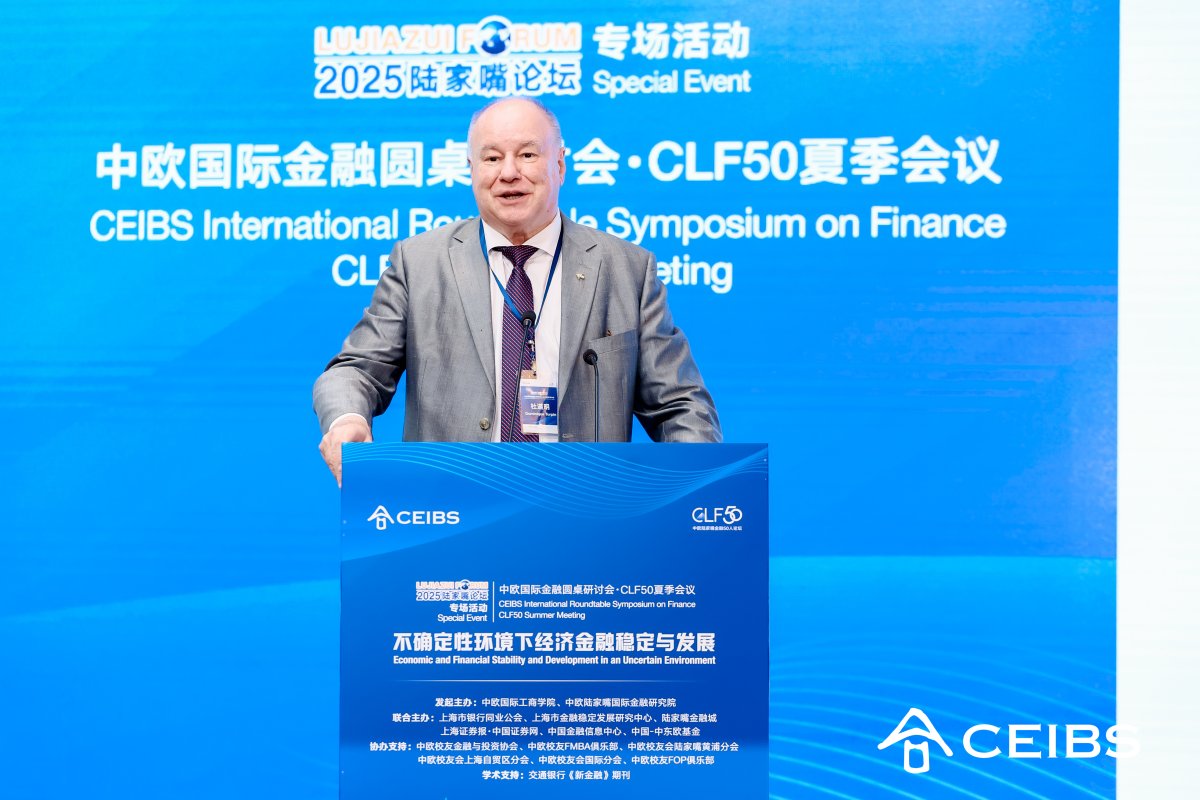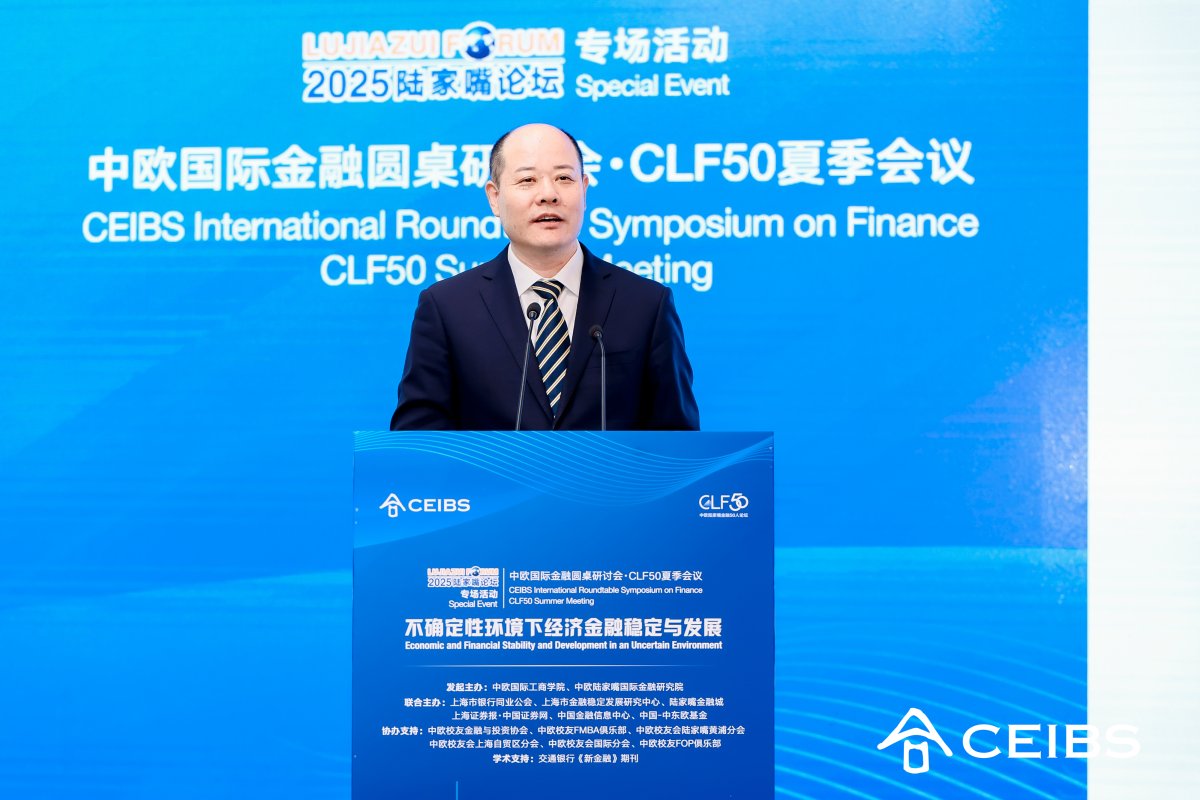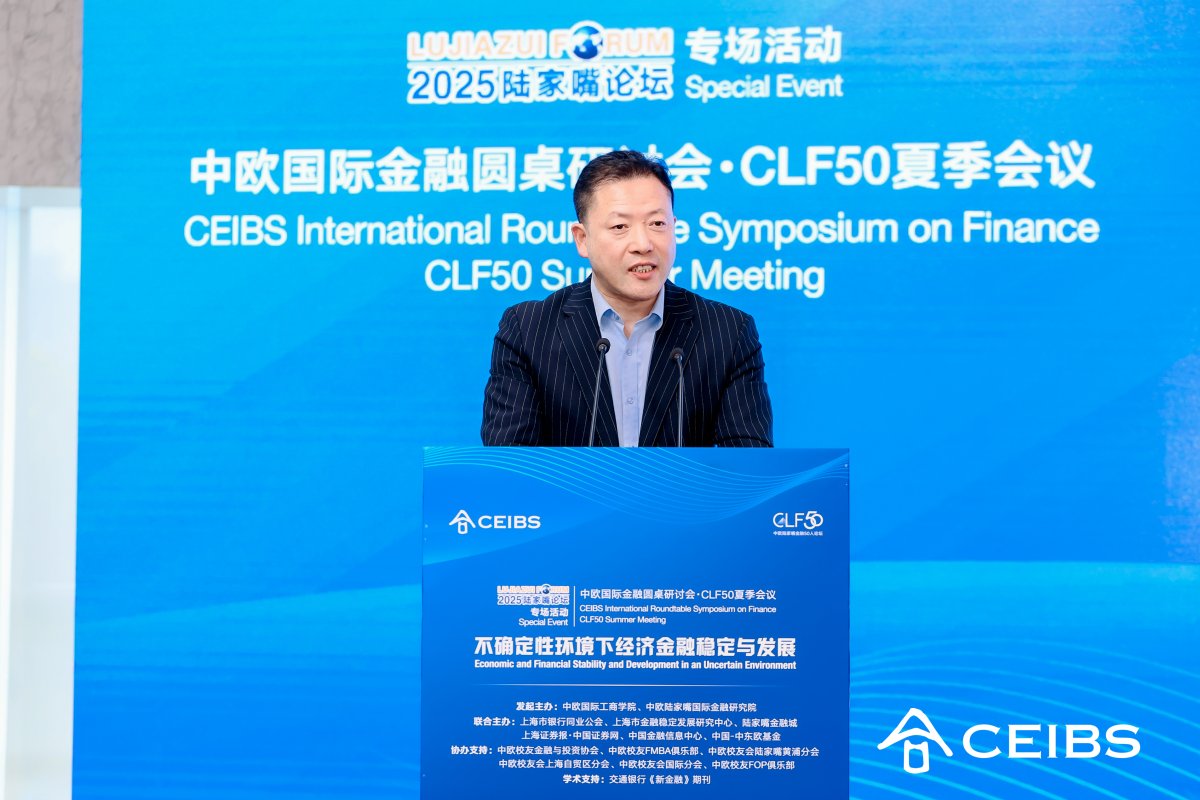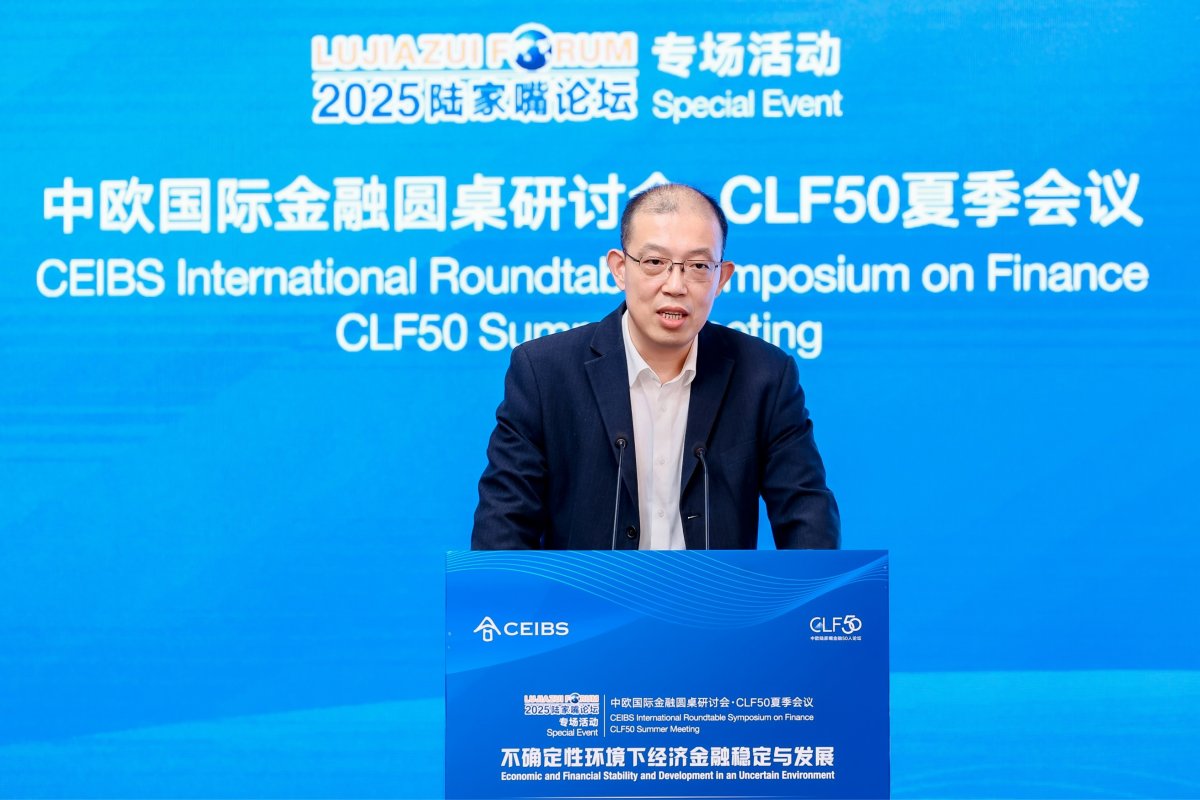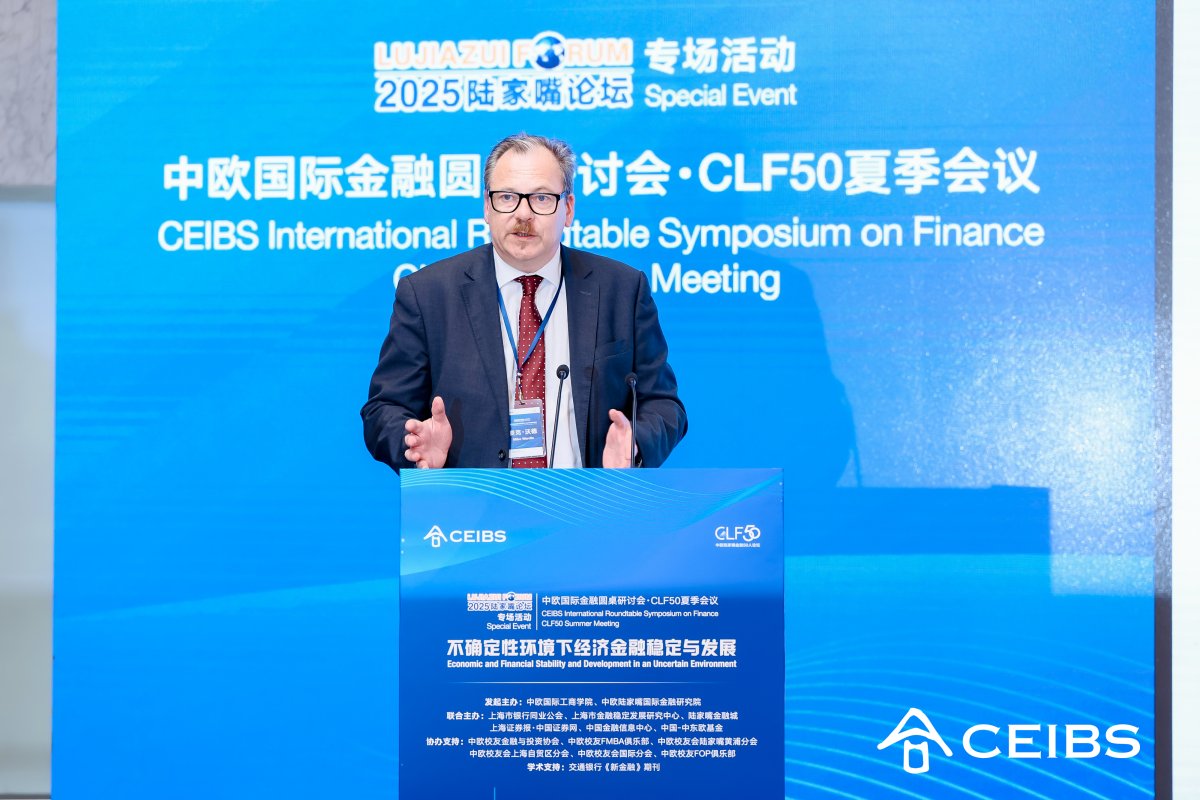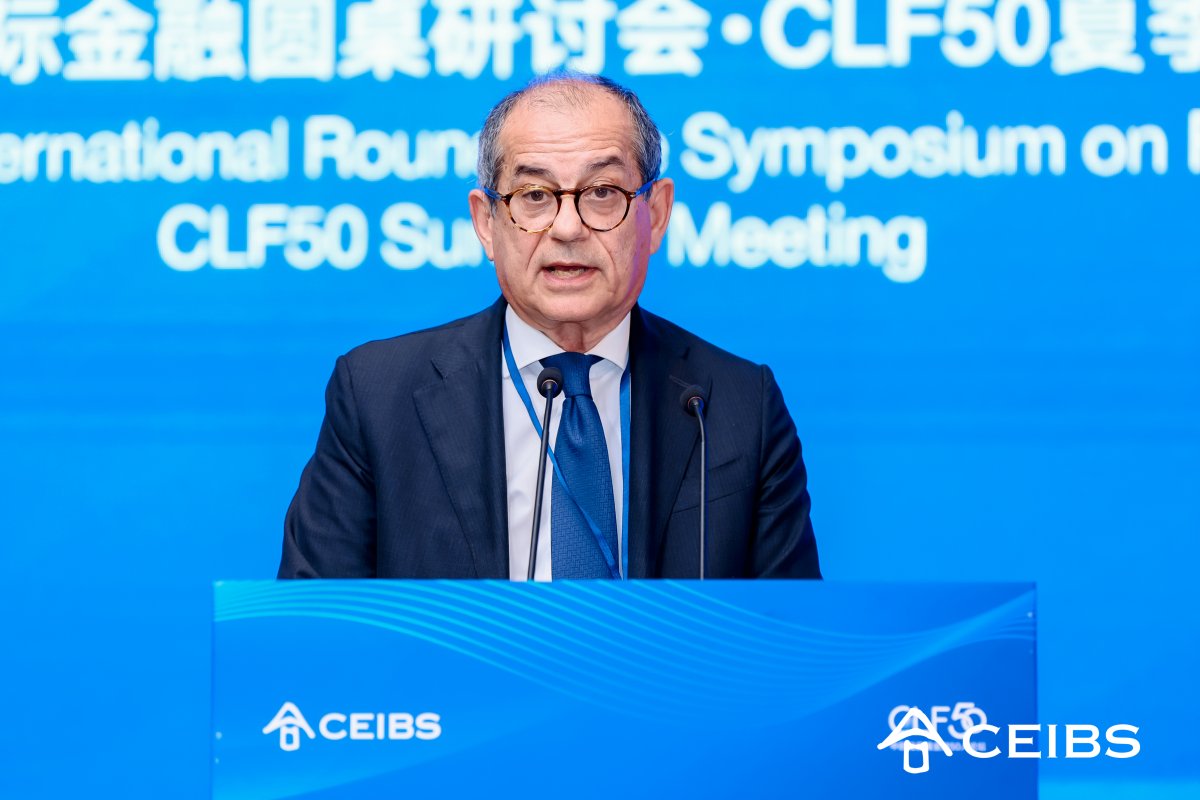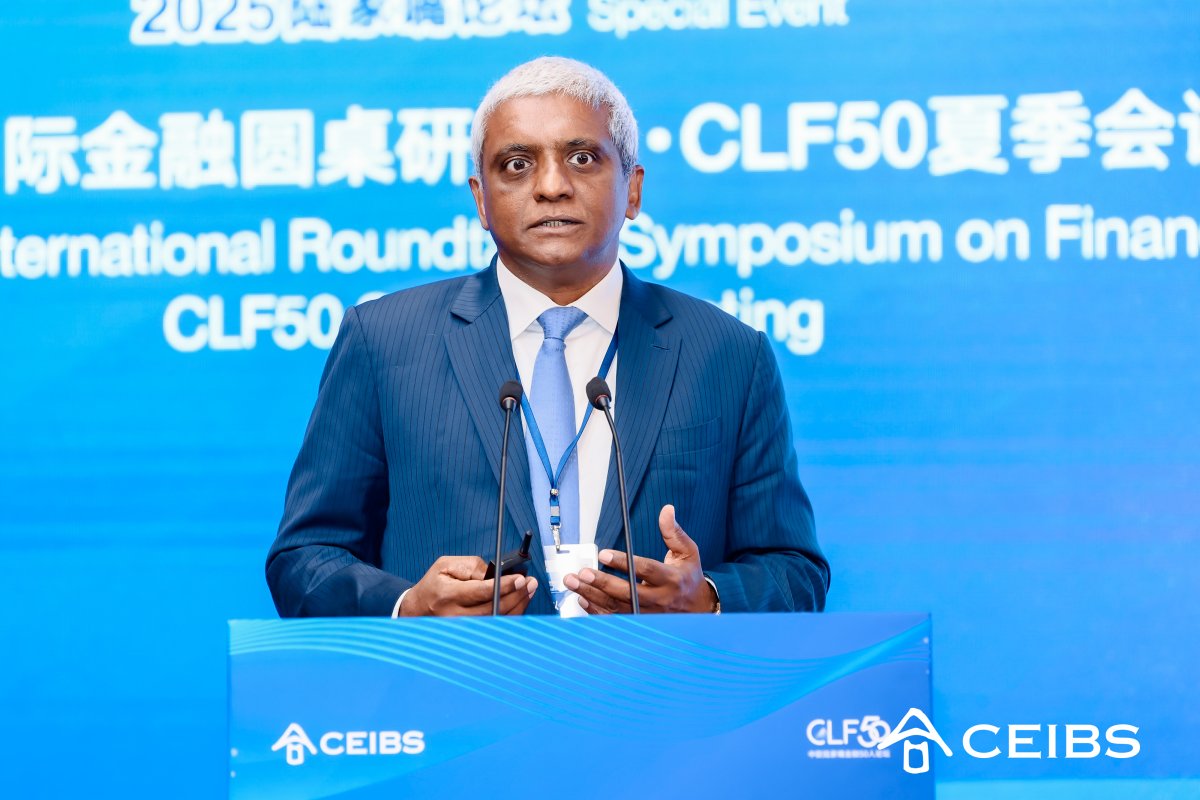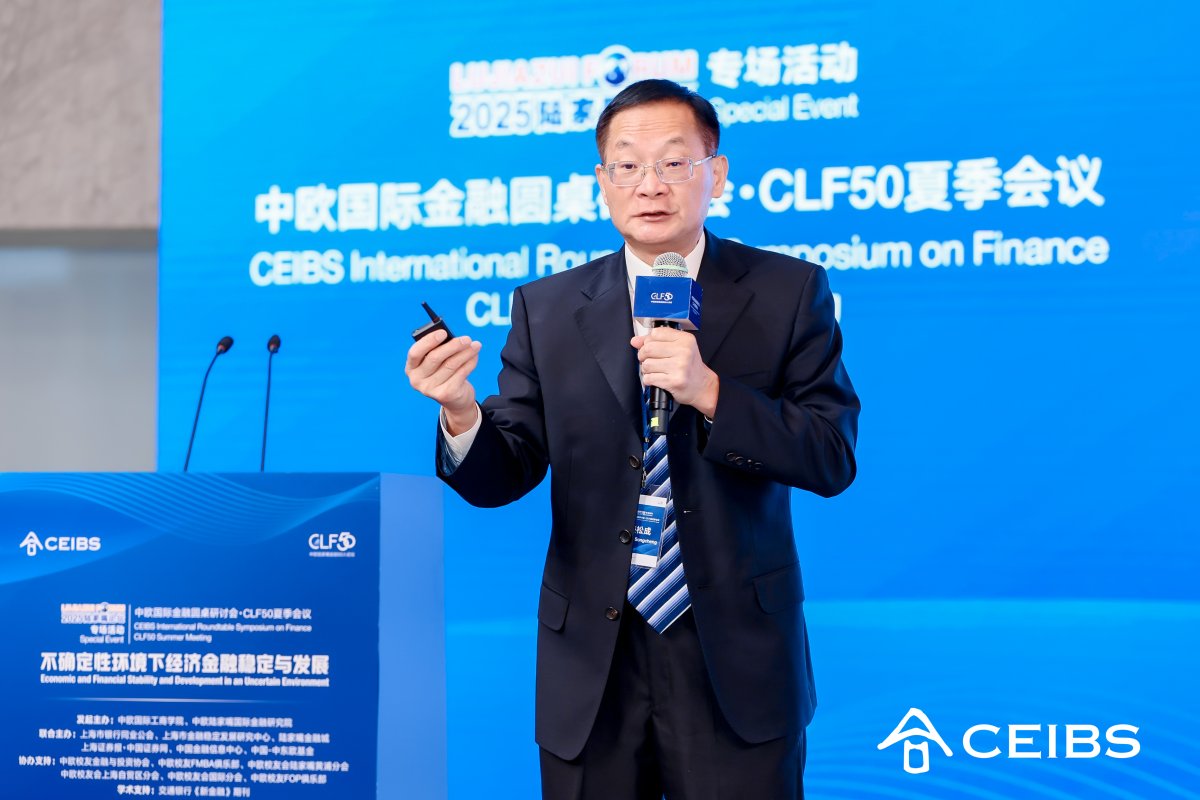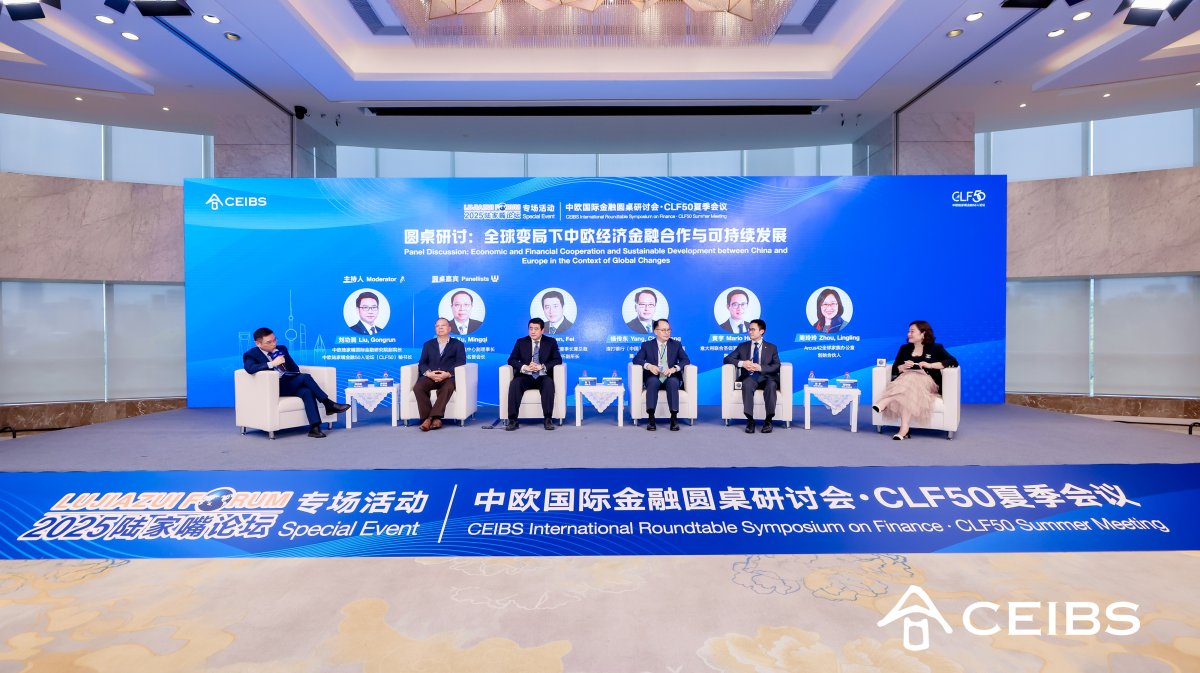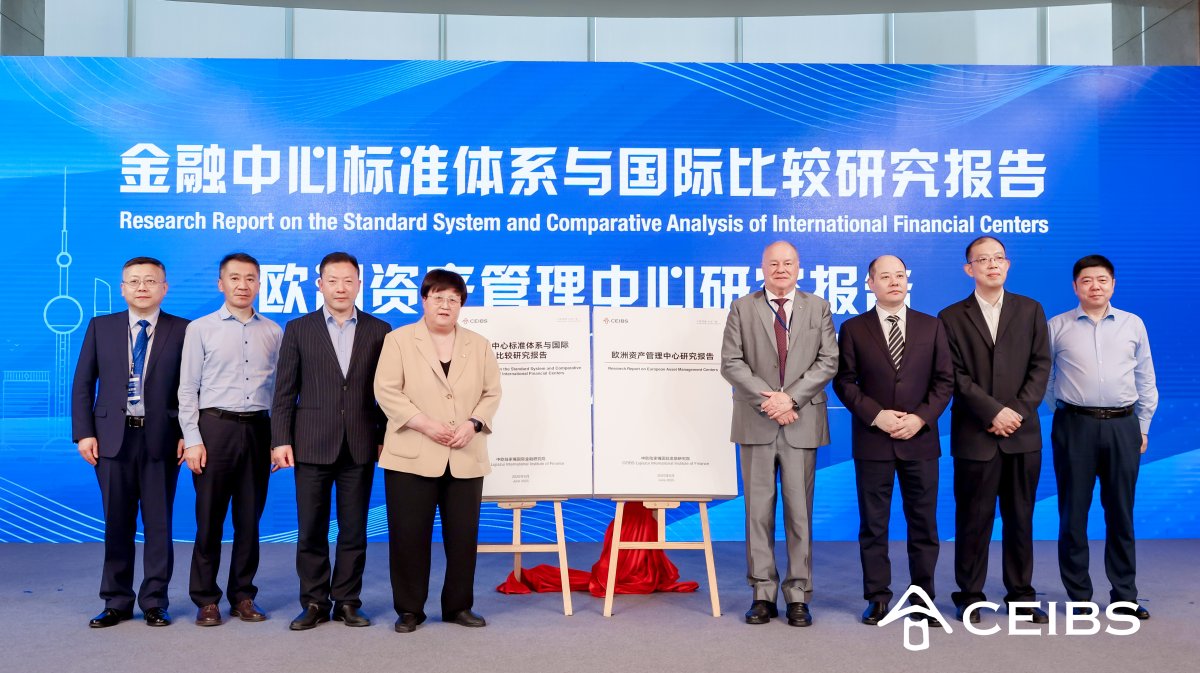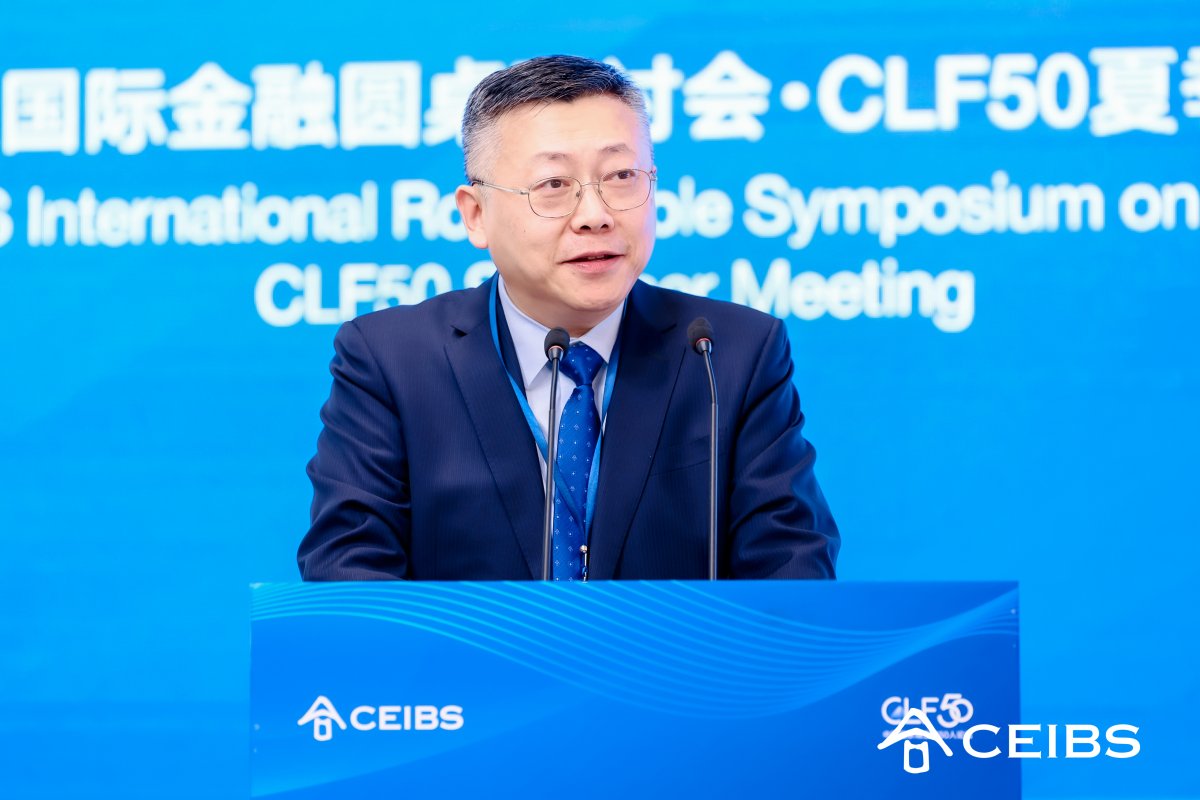CEIBS hosts International Finance Roundtable at 2025 Lujiazui Forum
June 19, 2025. Shanghai - As the global economic landscape grows increasingly complex, uncertainty driven by geopolitical tensions, trade frictions, climate change, and market volatility is posing a significant challenge to financial stability and sustainable development. Navigating this environment while driving financial innovation, support economic development, and accelerate the green transformation has become a pressing priority.
Against this background, the CEIBS International Finance Roundtable and CEIBS Lujiazui Financial 50 Forum (CLF50) Summer Meeting was held today with prominent scholars, industry leaders, and experts gathering to explore the topic of "Economic and Financial Stability in an Era of Uncertainty”.
Addressing the forum, CEIBS President Wang Hong noted that 2025 marks the 50th anniversary of China-EU diplomatic ties, a meaningful milestone upon which to reflect and look toward greater collaboration in the future. She highlighted how the relationship has evolved from simple trade and investment exchanges to a deeper, more strategic partnership aimed at shaping the future together. This shift reflects not only the maturity and depth of China-EU relations, but also a broader global transition toward new models of cooperation.
She emphasised that China and Europe are vital pillars of global stability and key partners in the green transformation, and share a foundation of trust in the building of resilient industrial chains. While acknowledging the existence of divergences, including in stage of development, institutional models, and rules of competition, she stressed the importance of dialogue and the building of common mechanisms to bridge differences and foster consensus amid diversity.
CEIBS President (European) Dominique Turpin then highlighted CEIBS' commitment to openness and international exchange, positioning the school as a platform for collaboration, knowledge-sharing, and the development of solutions to today’s pressing challenges.
“Digital finance has the potential to enhance financial inclusion, improve efficiency, and foster innovation. As we move forward, it is imperative that we support and regulate these advancements to ensure they contribute positively to our global economic system,” Prof. Turpin said. “The rise of fintech companies has introduced new dynamics in the financial industry, challenging traditional banks to adapt and innovate. This competition drives progress, but it also requires careful oversight to prevent risks associated with rapid technological adoption,” he added, suggesting that promoting the sustainable development of financial systems is an urgent task.
Prof. Turpin also advocated for fair and open global financial cooperation, enhanced talent exchange, and stronger international collaboration. “While we face numerous challenges, we also have great opportunities to reshape our financial systems for the better. By embracing digital transformation, prioritising sustainable development, strengthening international cooperation, and fostering talent and education, we can create a more open, cooperative, and resilient global economy,” he concluded.
Chairman of Shanghai Pudong Development Bank Zhang Weizhong then spoke, emphasising the role commercial banks must play as economic stabilisers amid rising global uncertainty. Highlighting China’s advances in AI and the emergence of the “AI+” economy, he noted that technology is transforming industries including manufacturing, finance, healthcare, and education.
He called on Shanghai’s banking sector to seize opportunities amid uncertainty by driving new productivity through financial services, supporting high-level opening-up, stimulating consumption through financial innovation, and embracing AI to reshape service models.
Chairman of Shanghai Securities News Ye Guobiao then highlighted China’s “Five Key Pillars” of modern finance - technological, inclusive, green, pension, and digital finance - as cornerstones for global cooperation and sustainable development. He described a systemic framework in which technology is the “skeleton”, the real economy the “muscle”, finance the “lifeblood”, and policy the “brain”. Only through synergy across all dimensions, he said, can a resilient innovation-driven economy emerge.
He also outlined a shift in China’s growth drivers, from the traditional “troika” of investment, consumption, and trade, to a new trio of modern finance, technological innovation, and industrial upgrading.
Xu Yaowu, Director of the Shanghai Research Centre for Financial Stability and Development, then noted the importance of risk prevention and systemic resilience in ensuring financial stability. He highlighted three structural shifts in global financial risk and policy response. First, he said, financial risks are increasingly moving from isolated incidents to complex, interconnected chains; Second, international policy responses are becoming more fragmented rather than coordinated; Third, the focus of financial technology is shifting from purely improving efficiency to security reconfiguration.
In developing Shanghai as a global financial centre, he stressed the need to balance openness and security, innovation and regulation, as well as autonomy and global integration. Xu advocated for strengthening China’s domestic financial infrastructure while actively engaging in global financial governance to enhance connectivity, competitiveness, and resilience amid global uncertainty.
Mike Wardle, CEO of Z/Yen Group, then shared his insights into how modern financial centres can adapt to today's uncertain world. He identified six key traits for successful financial hubs to aim for by 2030: green, digital, smart, inclusive, innovative, and liveable. As the global landscape evolves, financial centres are moving from competition to collaboration, he said, as cities such as Shanghai, London, Hong Kong, Singapore, and Paris begin learning from one another and collaborating in areas such as sustainability and technological innovation, working together to build a multi-layered, interconnected global network of financial centres.
In particular, he pointed out, Shanghai is emerging as a key hub in both green and digital finance. “A true international financial centre must be built on a globally diverse talent base and a foundation of international trust,” he stressed.
Giovanni Tria, Former Italian Minister of Economy and Finance and Dean of the School of Economics at the University of Rome Tor Vergata, then called for urgent reform of the global monetary system, noting that the global economy is faced with the three key structural challenges of rising macroeconomic uncertainty, increasing financial fragility, and declining confidence in the US dollar as a global reserve currency.
While lauding China’s progress in RMB internationalisation and cross-border digital payments, he called on China, the European Union and major economies around the world to jointly promote multilateral coordination mechanisms, a multi-polar reserve system, and Special Drawing Rights (SDR) reform, while strengthening the IMF’s clearing and liquidity support roles in today’s digital era.
Chairman and Founder of The Asian Banker Emmanuel Daniel then described how banks are being fundamentally reshaped by the digital age. He noted that innovation hubs like Silicon Valley demonstrate how concentrated resources of “geography, capital, and talent” drive rapid technological advancement. In China, cities like Hangzhou and Shanghai reflect similar patterns, he said: Hangzhou benefits from Alibaba’s innovation ecosystem, while Shanghai’s robust financial infrastructure and capital prowess make it a strong base for fintech development.
Looking into the future, he argued that financial infrastructure will be driven by digitisation and asset tokenisation. In emerging markets such as China, Brazil and India, the rapid rise of digital banks and the continuous evolution of payment systems are driving a deep reconstruction of financial infrastructure. He further urged Shanghai to tell its financial innovation stories and assert its voice in shaping the global financial order.
CEIBS Adjunct Professor of Economics and Finance Sheng Songcheng then argued that China's technological and product competitiveness provides long-term support for RMB appreciation.
He asserted that the accelerated pace of Chinese enterprises expanding abroad reflects both a necessity for global development and a strategic move in China’s global blueprint of industrial and supply chains. “Today, Chinese companies going global are showing greater diversity and a stronger focus on localisation, with private enterprises becoming increasingly active in overseas markets,” he said.
Prof. Sheng then emphasised mutual reinforcement between companies’ overseas ventures and RMB internationalisation, and predicted that despite short-term depreciation pressure, the RMB is likely to appreciate over the medium to long term.
The event also featured a roundtable discussion moderated by Vice President of CEIBS Lujiazui International Institute of Finance (CLIIF) and Secretary-General of the CLF50 Liu Gongrun on the topic of “China-Europe Economic and Financial Cooperation and Sustainable Development Amid Global Transformation.” The panel hosted Xu Mingqi, Vice Chairman of the Shanghai Institute for International Economic Exchanges and Honorary President of the Shanghai Institute of European Studies; Chen Fei, Vice Chairman and President of SINO-CEEF Capital Management and Deputy Director of the Economic Research Institute for Central and Eastern Europe; Yang Chuandong, President of East China Region and General Manager of the Shanghai Branch of Standard Chartered Bank (China); Mario Huang, Shanghai Branch General Manager of Intesa Sanpaolo and Board Member of the Italy-China Association; and Zhou Lingling, Founding Partner of Arcus42 Global Family Office.
Two research reports, A Comparative Study of Global Financial Centre Standards and Research Report on European Asset Management Hubs, were released during the event.
The event was moderated by CEIBS Professor of Finance and Accounting and Executive Deputy Director of CLIIF Zhao Xingge, and co-organised by multiple CEIBS alumni groups, including the CEIBS Alumni Finance and Investment Association, the CEIBS FMBA Club, the CEIBS Lujiazui (Huangpu) Alumni Chapter, the CEIBS Alumni International Chapter, the CEIBS FOP Club, and the Shanghai Free Trade Zone. Academic support was provided by New Finance magazine, published by Bank of Communications.







